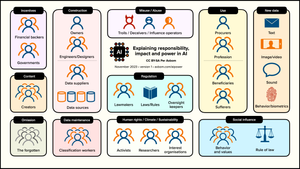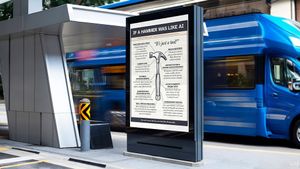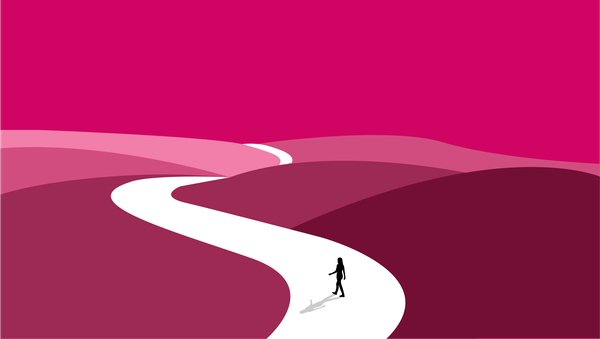“Whatever you focus your attention on will become more important to you even if it's unimportant.” — Sonya Parker
Turn left where you usually turn right
Where you are right now, look up and straight ahead. Take note of what you see. Now turn 45 degrees to the left and look straight ahead. Take note of what you see. Is there something you would not have noticed had you not consciously shifted the direction you were looking? Perhaps not, but I think you get where I'm going with this. When approaching problems and conflicts, changing perspective can be beneficial. And it can help you grow your intellectual humility.
When we travel at speed we lose our peripheral vision. And when we always travel the same route we tend to focus on the same thing. This amplifies the risk that we lose sight of the many different ways there are to see the world, and start to believe that the world we are seeing is very much like what everyone else is seeing.
Everyone will immediately agree that there are of course many perspectives. Even the person we were ourselves ten years ago likely saw the world differently. But breaking out of the thinking rut that we find ourselves in can be all but intuitive. This means it takes practice and training. Luckily, there are shortcuts to get us started.
These are some of my favorite techniques:
- Reverse the problem. Imagine it's your job to create the problem instead of solving it. In my ethics class my students get to re-imagine evil tech. This helps them identify new approaches to avoiding those effects.
- Change your surroundings. Go somewhere else (consider museums or playgrounds), move furniture around or lie down on your side.
- Imagine you're a different person. Think about one of your favorite artists, actors, historical figures or even a fictive person. How would they solve the problem?
One way to work this into your regular routine is to make a sport out of choosing different routes to your place of work, shop or library. Honestly, just choosing a different chair when having a meal, or using your other hand when brushing your teeth, can remind you about being open to other perspectives.
If you have some other techniques that you make use of, I would love to hear about them.
Yours,
Per
Ad UXPodcast™ is a twice-monthly digital design podcast sharing insights about business, technology and people since 2011. Hosted by James Royal-Lawson and Per Axbom, UX Podcast pushes the boundaries of how user experience is perceived and boosts your confidence in the work you do. The most recent episode is on Imposter Syndrome.» Listen on Apple Podcasts | Spotify | Stitcher | more...
Think-pieces and provocations
Fresh Cambridge Analytica leak 'shows global manipulation is out of control'
theguardian.com – Carole Cadwalladr
"More than 100,000 documents relating to work in 68 countries that will lay bare the global infrastructure of an operation used to manipulate voters on “an industrial scale” are set to be released over the next months."
Finland is winning the war on fake news. What it's learned may be crucial to Western democracy
cnn.com – Eliza Mackintosh
A multi-pronged, cross-sector approach preparing citizens of all ages for the complex digital landscape of today – and tomorrow.
I created my own deepfake — it took two weeks and cost me $552
arstechnica.com – Timothy B. Lee
Deepfake technology uses deep neural networks to convincingly replace one face with another in a video. The technology has obvious potential for abuse and is becoming ever more widely accessible.
The Invention of "Ethical AI"
theintercept.com – Rodrigo Ochigame
The majority of well-funded work on “ethical AI” is aligned with an agenda to voluntarily or moderately adjust, rather than legally restrict, the deployment of controversial technologies.
Tools and templates
The Habit Canvas
A one-page tool that can help you craft a science-backed plan towards building lasting habits and achieving your personal goals.
The Tarot Cards of Tech
A set of provocations that help you consider the impact of technology. They'll uncover unintended consequences and reveal opportunities for positive change.
Happy Hues
Happy Hues is a color palette inspiration site that acts as a real world example as to how the colors could be used in your design projects.
Inspiration and calls to action
Greater Good Magazine
Greater Good magazine turns scientific research into stories, tips, and tools for a happier life and a more compassionate society.
Beautiful News Daily
A collection of good news, positive trends, uplifting statistics and facts — all beautifully visualized by Information is Beautiful. Tip by Christopher McCann.
A new way to become more open-minded
hbr.org – Shane Snow
95 percent of people rate themselves as more open-minded than average, which, of course, cannot be true. This suggests that a great many of us carry on with a significant, and poorly acknowledged, weakness. Learn how to operate with more intellectual humility.
Go even deeper
The Intelligence Trap: Why Smart People Make Dumb Mistakes
by David Robson (book)
Smart people may be even more susceptible to making mistakes than others. And when they do, they risk hurting a lot of people. Learn about "strategic ignorance," "meta-forgetfulness," and "functional stupidity", and how to avoid them.
AI Now 2019 Report (PDF)
With 12 recommendations on what policymakers, advocates and researchers can do to address the use of AI in ways that widen inequality.
What Happens When An Economist Walks into a Brothel?
Clear+Vivid with Alan Alda, podcast
Allison Schrager set out to examine unusual subcultures, looking for clues that would deepen her understanding of risk and other economic realities, such as brothels. Allison offers her sage advice to Alan Alda on topics as varied as how to take risks and how hearing the word “no” can actually mean you’ve done well in a negotiation.
Appearances
March 30-31 • UX Copenhagen • Copenhagen, Denmark
At UX Copenhagen 2020 I will be giving a presentation on what design can learn from medical ethics: First, Design No Harm.
Use this coupon code for 10% off the General Admission ticket: 10QK207A
Psst. I also maintain a reference database with thousands of bookmarks with articles and comments on digital ethics. It's completely free to dive into.
“How wonderful it is that nobody need wait a single moment before starting to improve the world.” — Anne Frank












Member discussion